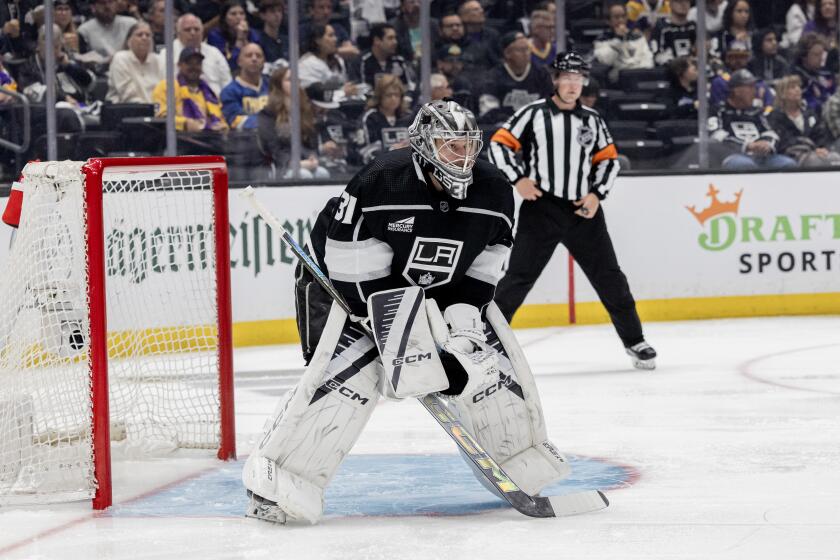Kings, Canucks Agree on Settlement for Quinn : L.A. Team Receives Unannounced Compensation for Loss of Its Former Coach
The Kings and the Vancouver Canucks, at odds both on and off the ice, apparently put an acrimonious bit of the past behind them Friday, reaching what was called a confidential settlement regarding compensation for the loss of former L.A. Coach Pat Quinn.
With the agreement, the Kings claimed victory and, at last, some measure of satisfaction.
“We are extremely pleased and fully vindicated,” King co-owner Jerry Buss said Friday night. “The settlement enables us to put this issue behind us and get on to trying to win hockey games.”
The Canucks have agreed to pay the Kings an undisclosed amount of money for their part in the Quinn affair, now more than a year old.
The matter was to have been settled at a Board of Governors meeting next Tuesday in Chicago, specially convened to determine how much, if any, financial compensation the Kings would receive from the Canucks.
Friday’s private settlement was intended to forestall the publicity the Chicago meeting was sure to generate and was meant, finally, to close the door on one of the most embarrassing episodes in National Hockey League history.
Last January, while Quinn was still under contract to the Kings, it was revealed that Quinn had signed a contract to become president and general manager of the Canucks.
He had also received a $100,000 signing bonus from the Canucks.
It was also revealed that the Kings had not immediately reported the transaction after learning of it.
Quinn was suspended by the National Hockey League and, on Jan. 30, in an unprecedent decision, NHL President John Ziegler fined the Canucks $310,000 for signing Quinn, the Kings $130,00 for not saying anything about it, and barred Quinn from coaching the Canucks until the 1990-91 season.
The Kings were not satisfied with the punishment meted out by the league and had asked that the Board of Governors award them $1 million in punitive damages from Vancouver. Ziegler ruled, however, that the board does not have the authority to award punitive damages.
That didn’t rule out the possibility that the Kings may receive compensatory damages, however.
Both the Canucks and Kings released short statements Friday, neither team giving details of the settlement.
A private settlement was what the league had worked for, so that the publicity of the meeting in Chicago would be muted and a difficult decision would be avoided.
All parties knew the Board’s decision would be a delicate one: Award too much money to the Kings and risk prompting the Canucks--who are already embroiled in a lawsuit with the league--to contest the award. Award little more than a token sum to the Kings--thus mollifying the Canucks--and risk legal action from the Kings.
Ken Doi, who was to represent the Kings at the meeting, agreed that the league was eager to settle the matter quickly--and quietly. Doi said that NHL officials had been acting as mediators between the teams.
“They (the league) want to see this thing settled,” Doi said. “No one wants to see it drawn out.”
Quinn told The Times Friday night that, even though he was the subject of the controversy, he had little to do with the settlement.
“It was a team-to-team situation,” Quinn said. “This was settled owner to owner. As far as the final decision, that was done at a level above my mandate here.”
The amount the Kings received from the Canucks was to compensate them for actual damages they suffered because Quinn left, and because of the manner in which Quinn left.
“We’ve had tremendous PR damage,” Doi said.
The Kings’ attorneys had calculated losses in gate receipts, season tickets and if the team might have lost games because of the controversy.
Doi said that Zeigler has ruled that Bylaw 32.1, under which the Kings have sought compensation, allows for only monetary compensation to be given. The Kings may not receive players or draft choices.
Times staff writer Jerry Crowe contributed to this story.
More to Read
Go beyond the scoreboard
Get the latest on L.A.'s teams in the daily Sports Report newsletter.
You may occasionally receive promotional content from the Los Angeles Times.






